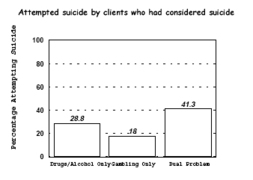Clinicians at the Addictions Foundation of Manitoba ask all clients about their suicidal ideation as part of the client assessment process. Treatment services are available for individuals with gambling-related problems (defined as a score of 2 or more on the Manitoba Gambling Pre-Screen–MGPS), alcohol and/or drug problems (defined as a score of 2 or more on the modified CAGE), and for those with “dual problems”. Dual problems refer here to problem gamblers who also take drugs or drink to excess as well as those with drugs or alcohol problems who also gamble excessively (2 or more on MGPS). Clinicians ask clients 1) if life is worth living, 2) if they are thinking about committing suicide, and 3) if they had ever attempted suicide. A recent study1 found that clients with dual problems were significantly more likely than clients who were only problem gamblers to report that “life was not worth living”. Seventy-five percent of the dual problem clients had ever felt that life was not worth living compared to 55.4% of gambling-only clients and 50.3 of alcohol/drug-only clients. Similarly, 70.3% of clients with dual problems had ever thought of committing suicide compared to 47.2% of clients with gambling-only problems and 41.1% of those with only alcohol or drug problems. Finally, investigators observed a similar pattern when clients who reported thoughts of suicide were asked whether they had ever attempted suicide. Forty-one percent (41.3%) of the dual problem clients that had thought of suicide had attempted suicide, while 18% of gambling-only clients and 28.8% of drugs and alcohol-only clients considering suicide had attempted suicide. The sample sizes for these groups are 352 (dual problems), 193 (gambling only), and 429 (drugs and alcohol only). In sum, in all instances in which data regarding mental health and suicide ideation were analyzed, presence of dual problems represents an additional risk compared with the presence of only gambling problems. The extent to which gambling stimulates drug and alcohol abuse, or drug and alcohol abuse stimulates gambling, remains to be determined. In addition, the extent to which a third underlying factor (e.g., depression) influences both single and dual disorders deserves more research attention. Clinicians assessing clients seeking help for addictive behaviors should be aware of the importance of screening for suicidal ideation.
Source: Kaplan, G., & Davis, B. (1997). Gambling, alcohol, and other drugs: Prevalence and implications of dual problem clients. Winnepeg, Manitoba: The Addictions Foundation of Manitoba.
This public education project is funded, in part, by The Andrews Foundation.
This fax may be copied without permission. Please cite The WAGER as the source.
For more information contact the Massachusetts Council on Compulsive Gambling, 190 High Street, Suite 6, Boston, MA 02110, U.S.





